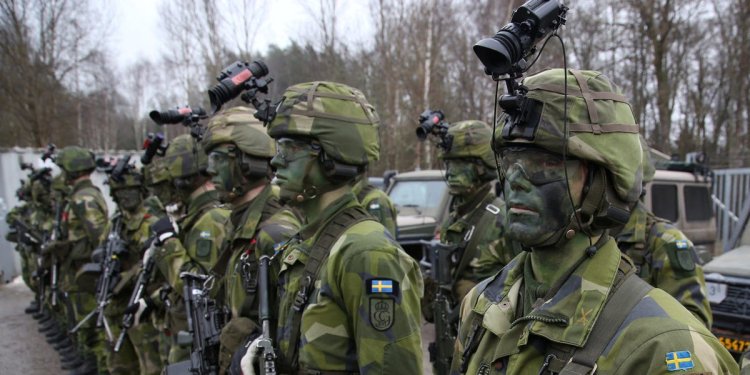Sweden is exactly what the West needs to counter Putin's underhand tactics
Sweden's membership of the NATO alliance poses massive new challenges to Russia in its bid to dominate its old Baltic territories.

Tom Little/Reuters
- Sweden this week became the newest member of the NATO alliance.
- Russia's war in Ukraine pushed Sweden away from decades of neutrality.
- Sweden will provide NATO with big advantages in deterring Russian aggression.
Russia's President Vladimir Putin has long harbored an obsessive grudge against NATO expansion.
He's claimed the invasion of Ukraine was a way of preventing the growth of the alliance close to Russia's borders and threatening its security.
But in the end, the Russian president seems to have achieved the exact opposite.
On Tuesday, Hungary's parliament voted to approve Sweden's NATO membership in a move that may be exactly what the West needs to counter Putin and his underhand tactics.
Its membership brings to an end its decades-old military nonalignment policy. It also means the post-Cold War era, where Sweden reduced the size of its military and sought better trade and diplomatic ties with Russia, is closed.
NATO's weak spot
NATO officials have long feared that the Baltic region in northeastern Europe is one of its most vulnerable areas, and if Russia wins in Ukraine, its next move could be to launch an attack on the region.
Oscar Jonsson, a defense specialist at the Swedish Defence University, told Business Insider, that Sweden would provide NATO with a large range of new options for striking back.
"Sweden will bring the strategic depth needed for launching air operations and missiles against Russian operations, but also be a difficult target across the Baltic Sea," he said.
"Moreover, Sweden brings an already interoperable Armed Forces that are highly competent in terms of technology and training although not in great quantity." JONATHAN NACKSTRAND via Getty
Sweden's membership of NATO means the alliance is the dominant force in the Baltic Sea.
For hundreds of years, the region has been a vital corridor for the Russian navy, Nima Khorrami, a Research Associate at the Arctic Institute, told Business Insider
He said that Sweden's "extensive coastline and numerous islands provide NATO with a unique advantage in navigating and controlling" the sea, and curtail potential Russian naval operations from its bases in the Baltic.
Khorrami added that, with Sweden's membership, NATO's borders have drawn even closer to Russia, meaning it could more effectively strike St Petersburg, Russia's second biggest city, and Kaliningrad, the Baltic enclave where Russia has nuclear-capable Iskander missiles.
"This adds another layer of deterrence against potential Russian aggression, as NATO forces can effectively respond to threats in real time," said Khorrami.
Sweden's total defense strategy
It's not just its geography that benefits NATO, it also has a unique approach to defense that could work in its favor.
Sweden has long lived under the threat of Russian aggression. After World War II, it adopted a "total defense" strategy, which states that every part of society, from school pupils to pensioners, has a role in the event of a war.
In the years after the collapse of the USSR, the strategy seemed like a relic from history and was wound down.
But in the face of the intensifying threat from Putin's Russia, it has been updated to use.
In 2018, after the Russian annexation of swaths of Crimea, Sweden issued a 20-page government brochure, titled "If Crisis Or War Comes," telling citizens what to do in response to crises such as power cuts or mass cyber-attacks.
Europe's leaders are taking notice of this strategy and trying to prepare their own citizens for the grim prospect of war with Russia. US Marine Corps/Staff Sgt. Shawn Coover
Latvia's foreign minister has called on allies to consider reintroducing conscription, while France's President, Emmanuel Macron, said this week that NATO should prepare for the possibility of war with Russia in as little as five years.
"It has already garnered significant interest from NATO states that have never had such a concept and want to learn," Jonsson remarked of Sweden's strategy.
One of the core ways Russia seeks to exploit the vulnerabilities and internal divisions of NATO states is through the promotion of disinformation and conspiracy theories. Sweden has accused Russia of spreading misinformation about Koran burnings to damage its bid for NATO membership.
Khorammi said that under its total defense strategy, the Swedish government had introduced policies to educate people about the dangers of disinformation, and they're policies other NATO countries would be smart to pay attention to.
"I do believe that a good number of the alliance members, as well as NATO as a whole, will look favorably upon Sweden's psychological defense agency and its work in prebunking 'mis' and 'dis' information," he said.
NATO has some major challenges
Despite the boost from Sweden's membership, NATO still faces some of the gravest challenges in its history.
The US has long underpinned the alliance. But Donald Trump, as he seeks to win back the presidency in this year's election, is again stirring hostility to the alliance, and questioning US commitment.
At a recent rally in South Carolina, he even said he'd invite Russia to attack NATO members who don't pay their dues.
And Russia responded to Sweden's initial moves to join NATO back in 2022 by threatening to deploy more nuclear weapons to the region.
Jonsson said that Sweden's move to join NATO was made after carefully calibrating the risks in a world growing more dangerous, and Russia's threats so far seem to be a bluff.
"Throughout the war in Ukraine and Western weapons deliveries, Russia has made big threats but did little in practice," he said. "The same is true for Finland and Sweden's NATO membership."
That may be so, but the Russian threat to NATO is as acute as ever, and the importance of Sweden's entry into the alliance should not be underestimated.
What's Your Reaction?




















